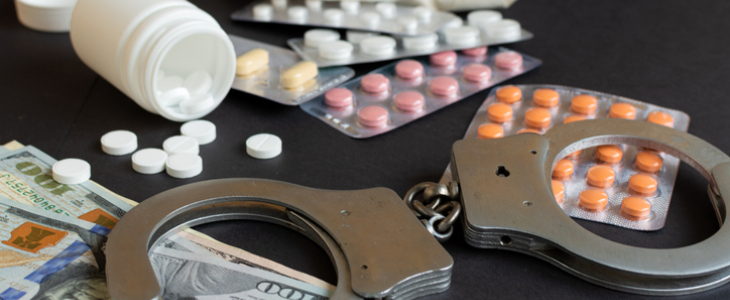Massachusetts has some of the strictest drug laws in the country, covering every part of the drug trade, including trafficking, distribution, sale, and manufacturing. The penalties for violating these laws are severe, especially for those accused of manufacturing controlled substances without the proper license. If you have been charged with drug manufacturing, it is critical to work with an experienced criminal defense attorney. At Geraghty Law, LLC, we know how to challenge these serious charges and protect your future.
What are the Elements of a Drug Manufacturing Charge?
In Massachusetts, a charge of drug manufacturing requires the prosecution to prove three key elements:
1. The substance is a controlled substance.
The drug in question must fall under one of the five classes listed in the Massachusetts Controlled Substances Act (Chapter 94C of the General Laws). These classifications determine which substances are regulated and subject to prosecution.
2. A measurable amount was manufactured.
There must be proof that the defendant produced a perceptible amount of the controlled substance—trace or residue amounts are not enough. Manufacturing includes compounding, conversion, or processing a substance. For example, compounding might involve mixing chemicals to create LSD, while conversion could mean altering a legal drug to produce an illegal one, like crystal meth.
3. The act was done knowingly or intentionally.
The prosecution must show that the defendant knowingly participated in the manufacturing process. This means it was not a mistake or accident—the individual must have acted with awareness and purpose in creating the controlled substance.
If you’re facing a drug manufacturing charge, it’s critical to work with a defense attorney who understands the complexities of Massachusetts drug laws and can challenge the prosecution’s evidence at every stage.
Punishments for Drug Manufacturing
Drug manufacturing charges in Massachusetts come with serious penalties, and the punishment largely depends on the classification of the substance involved. The Commonwealth categorizes controlled substances into five classes (A through E), with Class A carrying the harshest penalties. Repeat offenses can lead to even more severe consequences.
- Class A substances—including heroin, fentanyl, morphine, and ketamine—carry penalties of up to 10 years in state prison and fines of up to $10,000 for a first offense.
- Class B substances—such as LSD, Ecstasy, OxyContin, and amphetamines—carry a mandatory minimum of one year in jail, with maximum penalties reaching 10 years in state prison and fines of up to $10,000, depending on the specifics of the case.
- Class C substances—including hallucinogens like peyote and psilocybin, and narcotics like Valium and Vicodin—are punishable by up to 5 years in state prison and fines of up to $5,000.
- Class D substances, such as marijuana and phenobarbital, carry penalties of up to 2 years in state prison and $5,000 in fines.
- Class E substances, which include lower-dosage prescription medications like codeine, carry the lightest penalties—up to 9 months in county jail and fines of up to $2,500.
If you’re facing a drug manufacturing charge, it’s critical to work with a criminal defense attorney who understands how to challenge the severity of the charges and fight for the best possible outcome under Massachusetts law.
How To Defend Against a Charge of Drug Manufacturing
Being charged with drug manufacturing in Massachusetts is serious—but remember, the prosecution must prove every element of the crime beyond a reasonable doubt. You are presumed innocent until proven guilty, and there are several legal defenses that can be used to challenge the charges.
1. Illegal Search and Seizure
If the evidence was obtained through an unlawful search, your attorney can file a motion to suppress it. Under the Fourth Amendment of the U.S. Constitution and Article 14 of the Massachusetts Declaration of Rights, you are protected from searches without a warrant or probable cause.
Evidence may be excluded if the police:
- Searched your home, vehicle, or person without a valid warrant
- Lacked probable cause for the search
- Conducted the search in violation of your constitutional rights
2. Chain of Custody Issues
The prosecution must prove the controlled substance remained secure and unaltered from the time it was seized to the time it is presented in court. If there are any breaks or inconsistencies in the chain of custody, the evidence may be thrown out.
3. Lack of Intent
The prosecution must show that you knowingly and intentionally manufactured the drug. You may have a valid defense if:
- You accidentally created the substance
- You did not realize your actions constituted drug manufacturing
- There is no clear evidence of intent
4. Lab Certification Errors
To convict, the state must confirm the substance is an illegal drug under Massachusetts law. This requires:
- Testing by a certified lab analyst
- Proper documentation and handling of the sample
If the lab results are inconclusive or the testing process was flawed, your attorney can challenge the reliability of this evidence.
Each of these defenses can weaken the prosecution’s case. An experienced Massachusetts criminal defense attorney will evaluate every detail of your case to protect your rights and fight for the best possible outcome.
Contact Our Worcester Drug Crimes Attorney
The crime of drug manufacturing carries with it some very onerous penalties under Massachusetts Law. A conviction is considered a felony and will have a lasting impact on your life if you are convicted. The experienced criminal defense attorneys at Geraghty Law LLC will provide you with the representation you need to protect your rights under the law. Contact our office today.


